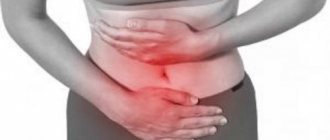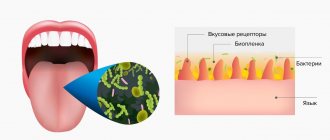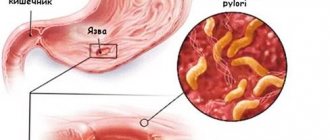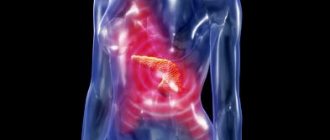Everyone knows what it feels like to have a stomach suck. This phenomenon is provoked by various factors, from nervous strain to serious gastrointestinal diseases. Often, if the stomach sucks, it means that it is asking for food. During the digestion of food, its walls contract. After the food ball drops lower, muscle contractions occur, spreading from the stomach to the nearest parts of the intestine. At this time, an unpleasant symptom is felt.
Why does it suck in the stomach?
Development of gastritis
Prolonged fasting is accompanied by sucking sensations that arise due to the aggressive effect of hydrochloric acid on the walls of the stomach. This can lead to pathological changes in the mucous membrane and the formation of erosions and ulcers.
If unpleasant sensations occur constantly, often nausea, pain and belching, this indicates gastritis. Inflammation of the mucous membrane disrupts the acid balance of the organ. The affected walls react sharply to the action of gastric juice, so it seems that there is a sucking sensation in the stomach. At the initial stage of the disease, the symptom may be mistaken for a feeling of hunger.
Peptic ulcer
With peptic ulcers, symptoms worsen after eating.
Depending on the characteristics of the manifestation and additional symptoms, a sucking feeling can be considered a sign of an ulcer. Stomach pathology appears 30 minutes after eating, and with intestinal disease, the stomach begins to suck a few hours after eating. The ulcerative process is characterized by the occurrence of unpleasant sensations at night. In addition, there may be pain, heartburn, and stool disturbances.
Nervous overstrain
A sucking feeling in the pit of the stomach occurs during times of stress, since the gastrointestinal tract is closely connected with the central nervous system. Any emotional fluctuation can provoke changes in the functioning of the stomach and intestines. During nervous tension, stress hormones are released, under the influence of which the nerve endings in the stomach are excited. For this reason, abdominal pain is more common in young people, as they are more susceptible to mood swings.
Hunger
A sucking pain in the stomach may signal the need to eat. The opinion that this is a safe cause of discomfort is erroneous. If the stomach, ready for work, does not receive food on time, its enzymes begin to break down its own mucous membrane. As a result, an inflammatory process develops that can be aggravated by the formation of erosion or ulcers.
Why does a sucking feeling occur in the stomach? Why is this dangerous?
The content of the article
A sucking and burning sensation in the stomach is a very unpleasant condition that can be a sign of a gastrointestinal tract disease and is often associated with fasting and an empty stomach. It occurs when digestive juices secreted by the cells of the stomach begin to irritate the delicate wall of the organ.
Under normal conditions, digestive juice is used to digest a portion of food. If there is no food or the walls of the stomach are thinned or covered with ulcers, gastric juice eats away the mucous membrane. Approximately the same situation is observed with a high concentration of acid in the stomach or with an excessive amount of it.
Feelings of hunger and stomach choke are a problem for people who are radically losing weight by trying to reduce their calorie intake by fasting. This practice, with an inadequate diet, can lead to inflammation of the gastric mucosa, belching and bloating.
Bloating
Sucking in the stomach is often accompanied by a burning sensation, pain in the lower abdomen and behind the sternum. These are signs of gastric or esophageal reflux disease, in which acidic contents move up the esophagus instead of down. Reflux disease is also indicated by chest discomfort.
With such symptoms, it is very important to undergo a correct diagnosis and quickly implement a therapeutic diet in order to be able to get rid of the unpleasant problem before it causes irreparable damage to the gastrointestinal tract.
Additional symptoms
As the disease worsens, appetite decreases.
In most cases, the reasons for constant sucking in the stomach come down to diseases of the gastrointestinal tract. At the same time, the patient complains of weakness, he does not want to do anything, since due to indigestion, nutrients are not absorbed, and exhaustion of the body develops. If a person has an ulcer, he may suffer from pain all night until the morning. To distinguish a pathological sucking feeling from hunger and fear, you should pay attention to the presence of additional symptoms. In most gastrointestinal diseases the following is observed:
- nausea;
- vomit;
- tachycardia;
- increased sweating;
- pain in the epigastric area;
- bowel dysfunction;
- loss of appetite.
When sucking pain and burning in the stomach is caused by a stomach ulcer
Sucking and burning in the abdomen are a clear symptom of a stomach or duodenal ulcer. Peptic ulcer is a limited defect of the mucous membrane with inflammatory infiltration. Its formation is most often associated with infection by the bacterium Helicobacter Pylori, which produces toxins that actively damage mucous cells. Over time, this develops into gastritis and leads to ulceration.
Helicobacter pylori
Helicobacter Pylori enters the body through food, dirt from hands, etc. And today up to 50% of the population are carriers of the infection. But dangerous symptoms, incl. Not everyone develops ulcers. Certain circumstances are required for the disease to develop.
Stomach ulcers can occur as a side effect of taking medications, mainly nonsteroidal anti-inflammatory drugs, which are common painkillers. Genetic factors and cigarette smoking also play an important role in the formation of ulcers.
The main symptoms of an ulcer include:
- abdominal pain after eating (usually 1-3 hours after eating);
- hunger pain, abdominal pain at night or in the morning;
- feeling of excessive fullness in the stomach after eating;
- vomit;
- sucking feeling or burning in the epigastrium.
Diagnostics
In women, a sucking feeling in the stomach appears due to hormonal changes during pregnancy.
Visualization of internal organs will help make the correct diagnosis.
If you often suck in your stomach for no apparent reason, you should consult a doctor and undergo an examination. Diseases detected at the initial stage of development are eliminated faster and easier than advanced pathologies. The following methods are used to make a diagnosis:
- Anamnesis collection. The doctor analyzes the existing complaints, their nature and frequency of occurrence.
- Clinical blood test. Indicates the presence and degree of inflammation in the body.
- Fibrogastroscopy. Reveals the condition of the stomach walls, the presence of an inflammatory or erosive process, ulcers.
- Probing and analysis of gastric juice. It is used when it is necessary to determine the acidity and characteristics of the enzymes of an organ.
Stomach pain and diseases: reasons why stomach sucks
Gastric suction combined with burning and particular discomfort in the abdomen can have many causes. But it is impossible to diagnose them by questioning the patient or palpation, since it will not be possible to determine the specific location of the pain.
The painful area may be on the left or right side of the abdomen, around the navel, or above the stomach. But in all these cases, the patient will indicate pain in the entire epigastric region, or in its different parts, depending on the position of the body, the presence of food in the stomach and other factors. This is due to the specific location of the gastrointestinal tract organs, their nerve endings and the emotional background of the patient.
In this case, aching or sharp pain, burning, and a sucking feeling in the epigastric region can be associated with diseases of the esophagus, duodenum, gall bladder, and even the heart.
The most common causes of a sucking feeling in the stomach:
- ulcer of the stomach (sucks after eating) and duodenal ulcer (usually after eating);
- gastritis;
- presence of parasites;
- gastroesophageal reflux disease;
- hiatal hernia;
- functional dyspepsia;
- gallbladder pathology;
- acute pancreatitis;
- cholangitis;
- stomach cancer.
Heartburn, which causes a burning sensation in the stomach and behind the breastbone, can also be a symptom of a heart attack. This condition is called a mask of infarction. This is not a common situation, but it is something to keep in mind.
Stomach sucking during pregnancy can be caused by an enlarged uterus, which puts pressure on the abdominal organs and causes typical reflux symptoms.
What treatment is prescribed?
Medicines
The action of antibiotics is aimed at the causative agent of the disease.
If a serious disease is detected, the sucking stomach is treated with medications. The doctor selects the course of therapy individually, based on the results of the examination. To restore the gastric mucosa, gastroprotectors are prescribed. In the presence of erosions and ulcers, special antiulcer agents are used. In addition, they use:
- antispasmodics;
- antacids;
- antibiotics;
- enzymes;
- antiemetic drugs.
Diet and lifestyle
If there is gastritis or an ulcer, the patient is prescribed dietary nutrition. Table No. 1 involves avoiding irritating foods such as spices, smoked meats, and coarse vegetables. Food should not be fried, and ready-made dishes are crushed using a blender before consumption. In the absence of gastrointestinal pathologies, it is important not to take long breaks between meals in order to prevent the development of gastritis and a feeling of sucking in the stomach. To treat and prevent disorders in the gastrointestinal tract, you should give up bad habits. It is recommended to lead an active lifestyle and often be outdoors. To avoid sickness in the stomach, you should avoid stress.
Diseases that contribute to gastric suction
When the stomach constantly sucks, the reason may be more serious. Often this symptom signals the development of a disease in the form of:
- hormonal disorders;
- lesions of the pancreas;
- gastritis;
- gastroduodenitis;
- ulcerative lesions of the intestinal tract or stomach;
- being in a state of prolonged stress.
If abdominal pain occurs due to prolonged stress, then you need to visit a psychotherapist. He will listen to the patient’s complaints, assess the situation, determine the cause and give several recommendations. In some cases, treatment is required to help relieve anxiety, increased excitability and eliminate fears.
If the patient addresses the problem in time, then plant-based products are used to restore and normalize the nervous system and relieve stomach cramps. Medicines may include elecampane, chamomile, and valerian roots.
If your stomach sucks after eating, then the reason lies in a diseased pancreas. This organ is responsible for the blood supply to the gastric mucosa, as well as the production of enzymes.
When the stomach sucks at night, this is due to hormonal disorders that occur during pregnancy or during menstruation.
When pain occurs, it is necessary to find out at what time it occurs. With peptic ulcers, discomfort appears an hour after eating or on an empty stomach. This condition is often accompanied by diarrhea, heartburn, nausea and vomiting.
When you feel sick and have a stomach ache, the reason lies in the development of gastritis. Such symptoms cannot be left without attention. Remember, timely treatment is a guarantee that a person will fully recover and avoid adverse consequences.
A little about gastritis
Gastritis is one of the common diseases that occurs as a result of the activity of a bacterium called Helicobacter pylori. Infection with microbes occurs as a result of household or contact methods, as well as non-compliance with hygiene rules. Gastritis can also occur due to poor nutrition and irregular meals.
The main symptoms of gastritis include:
- loss of appetite;
- belching with a sour taste;
- unpleasant odor from the mouth;
- the appearance of pain after eating spicy, sour, fried and fatty foods.
If the patient does not pay attention to his symptoms for a long time, the disease becomes severe. It is accompanied by acute pain, vomiting mixed with blood, and prolonged diarrhea. In such cases, calling an ambulance is required.










